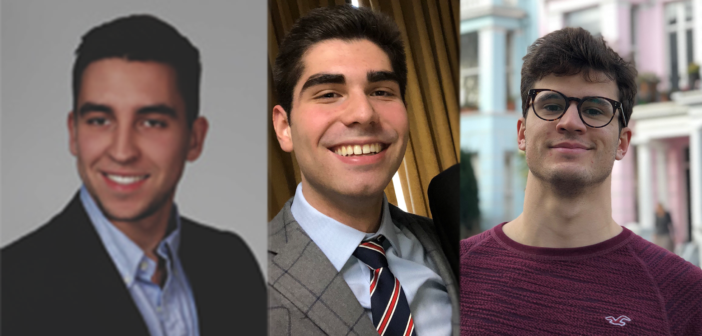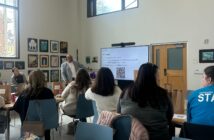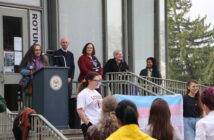Students from across the globe represent 78 countries at Lehigh. The “Lehigh Worldwide” series introduces some of these students, grouped by continent or region, and their experiences in the United States.
Salvador Monteiro Do Avelar Silva, ’20, of Lisbon, Portugal; Kimon Deligiannis, ’20, of Athens, Greece; and Michael Forzato, ’19, of Bern, Switzerland came to the U.S. for an education at Lehigh.
Q: How did you find out about Lehigh, and why did you choose to attend here over other institutions?
Salvador Silva: I originally wanted to go to Cambridge or Oxford, but then I decided to open up my horizons and look at different schools. I read a Lehigh brochure and became interested in it. Lehigh was just one of the schools I applied to in the U.S., along with Yale, Princeton and some others. I was pretty intrigued by how American colleges were very flexible with changing what you could study, while in the U.K. you are stuck with what you originally choose as your major. I was between Rotterdam and Lehigh and I decided to go to Lehigh for the adventure.
Kimon Deligiannis: I applied to American colleges and was between Lehigh and Boston University. I chose Lehigh because my father went here, and the pictures of campus sold me.
Michael Forzato: My dad went to Lehigh and graduated in 1985.
Q: What are some of the biggest culture shocks you have experienced while attending Lehigh?
SS: I had never been to the U.S. before and was two weeks late to Lehigh due to my Visa being delayed. I felt lost because I had missed orientation and felt that my American roommates were a little more prepared and knew the party scene already. I then quit some of my more time-consuming clubs, which allowed me meet more international students and make more friends.
KD: I did not have much of a culture shock here because I had went to an international school in London, where I had met many Americans before. I thought Lehigh would be much more studious, but was pleasantly surprised with how social it was.
MF: I do have family here in the Philly area, but yes there was absolutely culture shock. Going from an international school with schools of 60 nationalities to Lehigh where most people are from the tri-state area, was a definitely a big change.
Q: Is it difficult to be away from home?
SS: I was very adaptable from boarding school and very self-reliant. While I am very happy at home, I did not try to make Lehigh feel like home. I got busy with friends and joined a fraternity my sophomore year, where I feel very at home.
KD: I never felt the need to recreate home — Europe is so different from here. I try to embrace the local culture as much as I can because at the end of the day, if you try to recreate the “home” culture, you are never able to move on and enjoy your life where you are. I do, however, have Greece’s flag hanging in my room.
MF: I guess I would say that Greek life really helped me fit in on campus. Greek life was a great way to meet people I normally wouldn’t have. I think it is great how the system works, guys who are already in the house rush guys with similar interests, then for the lack of a better words everyone becomes friends in the house. I learned from my experience playing soccer in Germany that sports are also a great way of bringing people together that otherwise wouldn’t have been friends.
Q: What do you like best about the U.S. and Lehigh?
SS: I like the adventure of it all. Every semester has gotten better and better and had their landmark moments. I did not know much about Lehigh, but it has surprised me. I also love being a part of the European Union Club.
KD: The reason why most people come to the U.S., I think, is for a holistic experience. You get more opportunities, there is a balance of social and academic stimuli that aims to make you a more well-rounded person when you go out into society after graduation. Lehigh, specifically, is small so you don’t get lost, the people are social and friendly, and also want to have a good time, while also prioritizing academics.
MF: The alumni network is really great and you’re bound to have a great time at Lehigh. I feel like you can get that typical American college experience that so many high schoolers talk about at this school.






Comment policy
Comments posted to The Brown and White website are reviewed by a moderator before being approved. Incendiary speech or harassing language, including comments targeted at individuals, may be deemed unacceptable and not published. Spam and other soliciting will also be declined.
The Brown and White also reserves the right to not publish entirely anonymous comments.
1 Comment
Nice insight by these three because being an international student away from home is difficult, compounded by our complex culture and language problems. Welcoming and assimilation assistance must come from numerous sources, including the White House, to aid these young people embarking on life’s journey. Most struggle in their efforts and need guidance from schools’ international departments, immigration protection, host families, concerned neighbors and fellow students, and even informative books to extend a cultural helping hand so we all have a win-win situation.
Something that might help anyone coming to the US is the award-winning worldwide book/ebook “What Foreigners Need To Know About America From A To Z: How to Understand Crazy American Culture, People, Government, Business, Language and More.” Used in foreign Fulbright student programs and endorsed worldwide by ambassadors, educators, and editors, it identifies how “foreigners” have become successful in the US, including students.
It explains how to cope with a confusing new culture and friendship process, and daunting classroom differences. It explains how US businesses operate and how to get a job (which differs from most countries), a must for those who want to work with/for an American firm here or overseas.
It also identifies the most common English grammar and speech problems foreigners have and tips for easily overcoming them, the number one stumbling block they say they have to succeeding here.
Good luck to all at Lehigh or wherever you study or wherever you come from, because that is the TRUE spirit of the American PEOPLE, not a few in government who shout the loudest!